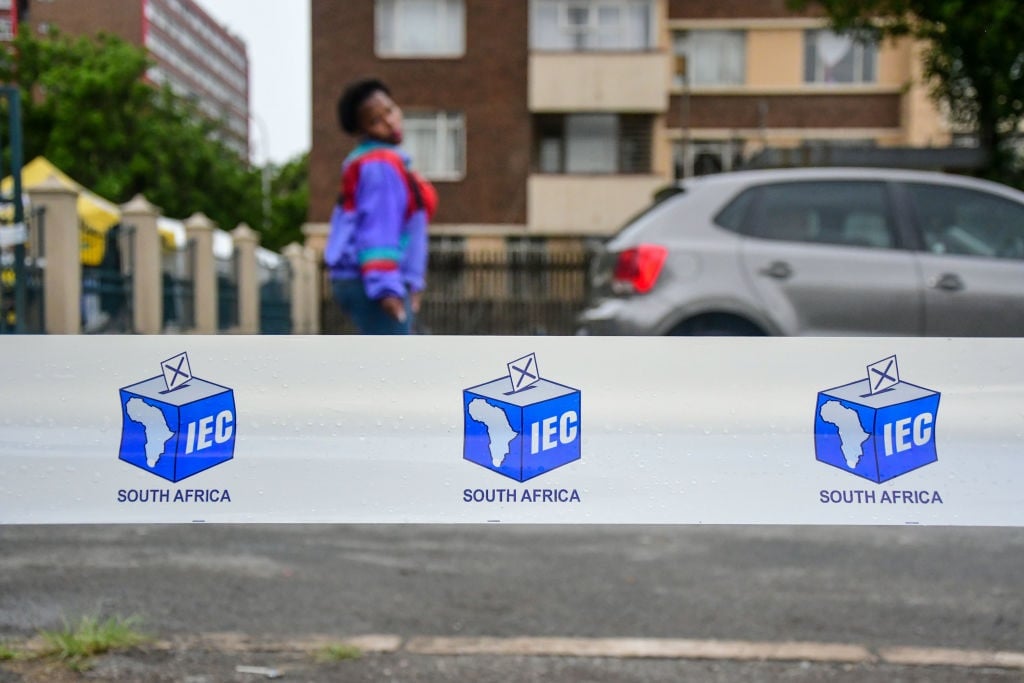
The IEC is working with social media companies and Media Monitoring Africa to combat disinformation ahead of next year’s elections.
Darren Stewart/Gallo Images via Getty Images
- The IEC, Media Monitoring Africa, and social media companies Google, Meta, and TikTok have signed a cooperation framework to combat disinformation ahead of next year‘s elections.
- The IEC considers disinformation a threat to a fair and credible election.
- The framework includes the companies‘ cooperation with a complaints platform.
To combat disinformation in next year’s election, the Electoral Commission of South Africa (IEC) has partnered with social media companies Google, Meta and TikTok and local NGO Media Monitoring Africa (MMA).
The IEC, MMA and social media companies signed a cooperation framework this week, which the IEC said was a “crucial step towards safeguarding the integrity of information and preserving the fundamentals of our electoral processes”.
IEC chairperson Mosotho Moepya added in a statement the framework was important because disinformation posed a threat to exercising various rights and accessing constitutional protections, including freedom of expression, access to credible information, and the freedom to make informed political choices.
“The dissemination of disinformation has huge potential to undermine the fairness and credibility of elections.
“Credible information is the lifeblood of all democracies. Trustworthy information is crucial in the process that enables citizens to choose their leaders,” said Moepya.
Among other things, the framework enables its signatories to cooperate with the IEC and MMA in initiatives including the complaints platform Real411.org and PADRE.org.za.
READ | Fighting fake news and disinformation ahead of the election
PADRE, run by the IEC and MMA, is a platform for registered political parties to upload all official digital political adverts and for citizens to be able to search through and view those adverts.
“Real411 takes proactive measures against disinformation. Upon careful review of any reported complaint indicating disinformation or misinformation, the commission promptly notifies the relevant online platform.
“The platform is expected to acknowledge and swiftly process the notification, ensuring a diligent response,” said MMA director William Bird.
The social media platforms will bolster resources to prioritise referrals from the IEC during the election period.
Actions taken by the platforms are in terms of their policies and may include removing the content, publishing an advisory warning, or delisting the post.
Real411 will form part of the work of the IEC’s directorate of electoral offences, which was first established ahead of the 2016 local government elections to investigate alleged breaches of the code of conduct and prohibited conduct as contained in the Electoral Act.
The directorate, comprising independent attorneys, operates throughout the term of the election timetable. It investigates complaints and provides recommendations for possible further action.
Real411 complaints about disinformation will be considered by a panel of relevant experts, including those with expertise in media law, social and digital media.
They will make recommendations for possible further action for the consideration of the IEC.
The initiative will also include information to help educate voters about the dangers of disinformation and how to spot it.
READ | Elections watchdog IEC backtracks on disinformation probe against Zille
The social media partners stressed they have policies and mechanisms in place to counter disinformation and would continue to use it in a collective effort to eradicate falsehoods.
The senior manager for government affairs and public policy at Google Southern Africa, Abongile Mashile, said, according to the IEC’s statement: “Google has always been committed to supporting democratic processes, including supporting elections integrity and ensuring trust among voters.
“We place a big focus on creating products and programmes that enable people across the globe to engage with these activities through information that is accurate, protecting elections and campaigns from bad actors, as well as assisting campaigns in managing their digital presence.”
According to the public policy director for Africa at Meta (Facebook, Instagram, and WhatsApp), Balkissa Idè Siddo, protecting the integrity of next year’s elections was a “key priority” for the company.
She said:
As our platforms continue to play an important role in civic discussions around the world, including here in South Africa, we know we have an important responsibility.
“Using lessons from the past, and input from a range of experts, including dedicated and local teams within Meta, we continue to make substantial investments to help take aggressive steps in fighting abuse across our platforms, while rolling out policies and products to help ensure a safe and secure general election.
“We welcome the opportunity to collaborate with the South African electoral commission.”
TikTok’s public policy and government relations director, Fortune Mgwili-Sibanda, said they took the responsibility to protect their community and platform seriously.
“We’re proud to be a place that brings people together over creative and entertaining content, and we work hard to keep harmful misinformation and other violations of our policies off our platform,” added Mgwili-Sibanda.